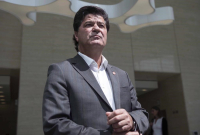Support strong Canadian climate journalism for 2025
Wooing workers in Canada's union heartland was the focus for federal party leaders this Labour Day, with Liberal Prime Minister Justin Trudeau, Conservative Leader Andrew Scheer and NDP Leader Jagmeet Singh all in Hamilton, Ont.
Trudeau participated in the annual Labour Day parade there, Singh was to catch up with the participants at the annual Labour Day picnic, and Scheer was expected at the Labour Day classic football game between the Toronto Argonauts and Hamilton Tiger Cats.
Hamilton has a long-standing connection to Canada's union movement as the historic epicentre of the steel industry and related businesses. It was there in the 1870s that workers first agitated for the government to legislate shorter work days, an effort that eventually led to the first national union, albeit a short lived one.
Hamilton is also home to five federal ridings: the Liberals hold two, the NDP two and the Conservatives one, with the vote bouncing between all three parties in recent elections.
The riding of Hamilton Centre is expected to be closely fought between the NDP and the Liberals this election. David Christopherson, the NDP MP who has represented the area for over a decade, has retired, leaving his seat vulnerable.
Meanwhile, the NDP are hoping to take the riding of Hamilton East-Stoney Creek away from the Liberals by counting on support from steelworkers who have complained about their treatment at the hands of the current local Liberal MP.
Singh made a pitch to union workers Monday, promising that if his party forms government, they'd bring in legislation to end the ability of companies to replace striking workers with temporary employment. He also promised to immediately raise the federal minimum wage to $15 an hour and ensure better protections for contract workers.
"This is what you get when you get a New Democrat," Singh said during an event Monday morning in Toronto before he headed to Hamilton. "You get someone on your side."
Singh was joining Labour Day events in Hamilton at the invitation of the local labour council, while Trudeau was invited by the local chapter of the Labourers International Union of North America, which represents construction workers, among other industries.
In his statement for Labour Day, Trudeau noted his government's efforts to improve the lives of workers, pointing to money spent on skills training and legislation to protect collective bargaining rights, among other things.
Canadian workers are the backbone of the country's success, he said.
"We will always stand up for workers and their families, and make sure they have the support they need to succeed in the jobs of today and tomorrow."
A group of protesters briefly stopped the union group from marching in the parade, forcing Trudeau to join in several blocks down the parade route. From there, he moved onto the area's Labour Day picnic, where he was greeted by the same protesters, who among other things were calling for more action for sufferers of mercury poisoning in Grassy Narrows First Nation.
While unions traditionally divide their support between the Liberals and the NDP, they have historically united in opposition to the federal Conservatives.
Many joined forces ahead of the 2015 election to campaign collectively against former prime minister Stephen Harper, and have united again ahead of the current election. Scheer was the target of an intense round of negative advertising earlier this year, paid for by the union-backed group Engage Canada.
In his Labour Day statement, Scheer focused, however on celebrating the labour movement.
"When Canadians succeed, our nation prospers," he said.
"On Labour Day, I encourage all Canadians to reflect on our nation's past, to celebrate the hard workers you know, and welcome new Canadians who have come to Canada."





Comments